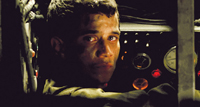
LEBANON
Israel, 2009, 90 minutes, Colour.
Directed by Samuel Maoz.
A war film worth seeing and reflecting on.
Writer-director, Samuel Maoz has made a statement that begins, 'On June 20th 1982, I killed...'. He explains how this experience for a young Israeli man being part of an attack on Lebanon meant that he felt that he had really died there. It took 25 yuears for him to recover some life, recreate this experience and that of the other 20 year olds who had previously fired only at barrels of oil, enjoying the macho spectacle of explosions but who were now ordered to fire at people and buildings.
Are then any other films set within a tank? Though the film is framed by memorable images of a field of sunflowers.
We spend the first day of the war mainly inside the tank, advancing, being fired on, stuck. There is the driver, the commander, the explosives loader and the gunner. They are in radio contact with a high command. The local officer commanding the infantry comes to give them orders at different times during the day. They have to load a dead soldier into the tank then hook him to the helicopter cables for his rescue. They have to keep guard on a Syrian prisoner. They have a visit from a secretly bloodthirsty phalangist who is supposed to lead them to safety.
The commander, finding it difficult to command and communicate with his men, is under stress. His friend, the loader, complains and takes over. The driver wants a message sent to his lonely mother. The new gunner fails to shoot an oncoming hostile vehicle and battle breaks out.. When he does shoot, innocent civilians are killed and apartments and shops destroyed.
The film shows the details of death and devastation for the Lebanese.
Perhaps it is presumptuous for an Israeli film to be called Lebanon. Hawkish critics may dismiss the anguish, confusion and fears of the young recruits as wimpish. However, for an Israeli audience, it presents a totally sombre picture of war and its consequences for 'enemies' as well as the soldiers. It is complemented by the film Beaufort which shows the last day of the occupation in the early 90s. Waltz with Bashir also offers sombre background to this war.
1.Israel’s perspective on itself, wars, antagonism with Lebanon? The 1980s, 1990s? 2006?
2.Audience interest in Israel, their wars, occupations of Lebanon, clashes with Lebanon? The Phalangists?
3.The film as set completely within a tank, the effect for the audience? Claustrophobic or not? Action within the tank? Outside? The various functions for the four men, the interactions with officers, Syrian prisoner, Phalangist? The tensions, communication?
4.The style of photography, the interiors, close-ups of the men, the war situations, the cross-hairs of the lens? The night vision? Day? The jerking of the sights around the target areas? The exteriors in the town, the building, the road? Musical score?
5.The sunflowers and the contemplation at the beginning? The framing? The tank in the middle of the sunflowers at the end?
6.The first day of attack, the tank’s moving, the bombings, the troops on foot, the helicopters?
7.The four in the squad: Assi as commander, Hertzl as his friend, the loader of explosives? Shmulik as the gunner? Yagal as the new man, the driver of the tank?
8.Jamil, in command, his orders? The radio orders, control, the strategies? Jamil and his orders? Moving in and out of the tank, the dead soldier, the helicopter lifting him, the Syrian prisoner? His power, eventually defying the authorities, asserting that he was not lost? Ordering the tank out?
9.Assi as commander, the issue of sleep, Hertzl and his not wanting to be on guard? Their friendship? Assi and his collapse?
10.Yagal, young, the only son, wanting to get the message to his mother, the hit on the tank, his despair at working the controls, Jamil empowering him to get the tank moving, driving, hit, dying – and the news of the message having got through to his mother?
11.Hertzl as the veteran, young, not wanting to be on guard, the issue of sleep, arguing with his friend Assi, defying him? Drinking, the eating? The guns? His taking charge?
12.Shmulik, young, new, practising firing on oil barrels, confused under orders, not wanting to kill anyone, the oncoming car, the militants, the fighting, the deaths, firing on the van with the man with the hens? Growing stronger, shooting, hitting targets?
13.The Syrian prisoner, captured, his wanting to drink, urinate? The Phalangist and his cruelty in talking to him about the atrocious torture? The man’s despair, the men trying to comfort him, giving him the morphine?
14.The Phalangists, the Christian Arabs, their agenda, driving the car, the plan for them to lead the tank away, coming into the tank, the man describing the torture, genially talking to the soldiers? Issues of language, Hebrew, Arabic, Syrian?
15.The bombings on the town, the young boy and his running away, the old man survivor sitting and staring at them? The building, the militants taking the family, the father falling to his death, the death of the child, the mother hysterical, naked, Jamil’s reaction? Trying to calm her?
16.The various tableaux of death and destruction? Audience sympathy for the fate of the Lebanese?
17.Driving, lost, moving out of the centre?
18.The effect on the survivors, their first day of war?
19.The sunflowers – and the audience contemplating the tank in the middle of the sunflower field?